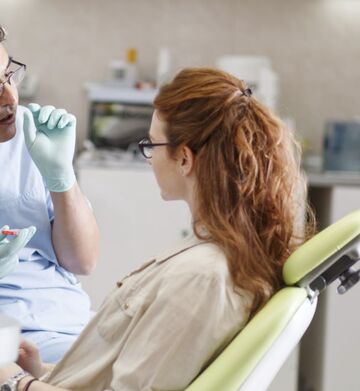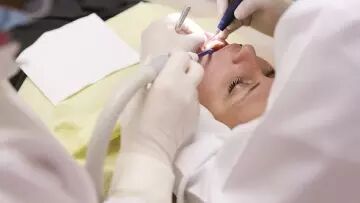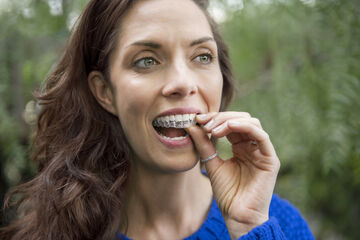
ContactKnow Your Risks of Developing Mouth Cancer
Our mouth helps us to breathe, talk, eat and swallow. Mouth cancer includes any cancer in the oral cavity including the lips, the front two-thirds of the tongue, the upper and lower gums, the inside lining of the cheek and lips, the floor of the mouth, the roof of the mouth and the area behind the wisdom teeth.
Mouth cancer is one of the few cancers in the UK which has seen cases rise, over the past decade there has been an increase of nearly 50% in the number of people being diagnosed with mouth cancer with men being twice as likely to be affected than women. This year in the UK more than 8,000 people will be given the life-changing news that they have mouth cancer and it still claims more lives than cervical and testicular cancer combined. However, with early diagnosis, the five-year survival rate can be as high as 90%.
On top of these more general factors, there are certain specific factors which can increase the risk of developing mouth cancer.
Risk Factors
Smoking and Alcohol
Smoking tobacco and consuming large quantities of alcohol are the two main risk factors for mouth cancer. A study in 2011 found that half of all mouth cancers could be linked to smoking and a study by Cancer Research UK found that a third of mouth cancers are caused by excessive alcohol consumption. Current guidelines suggest that men should drink no more than 21 units of alcohol per week and women should drink no more than 14 units.
Chewing tobacco and betel quid is not a safe alternative to cigarettes and has in recent years seen a growth in popularity in the UK as more people migrate from Asia and Europe.
The harmful substances in tobacco and betel quid can cause cancer when in contact with your gums and tongue for long periods. Tobacco and alcohol contain nitrosamines and other chemicals which have been linked to cancer.
To reduce your risk be sure to keep your alcohol consumption within the weekly guidelines and consider quitting smoking. Your dentist will be able to offer help and support in quitting and will also be able to direct you to other services which can help you quit.
Diet
A poor diet can increase your risk of developing mouth cancer. This can be due to a lack of vitamins and minerals.
A diet high in fresh fruit and vegetables seems to reduce the risk of developing mouth cancer. Foods high in antioxidant vitamins help to prevent damage to body cells.
Sunlight and Sunbeds
Skin cancers are relatively common on the face and neck as these are areas most often exposed to ultraviolet light. Both the sun and tanning beds give off ultraviolet rays. These rays can cause skin cancers in unprotected skin. Melanoma the most serious type of skin cancer can occur on the lips.
To reduce your risk be sure to use a high-factor sun cream on your face and neck to help reduce exposure to ultraviolet rays. If you still want that sun-kissed look there are many self-tanning products available which pose no risk to your health.
Mouth Conditions
Some changes can occur in the cells in the lining of the mouth and they can cause red or white patches to appear. In some people, over time these changes may develop into cancer. At your dental appointments, your dentist will be able to notice any changes and will then refer you to have them analysed further.
Symptoms to look out for
Ulcers that do not heal
A broken area of skin or ulcer that does not heal within three weeks is one of the two most common symptoms of mouth cancer. They may not necessarily be painful.
Persistent discomfort or pain in your mouth
Ongoing pain or discomfort in the mouth for which you cannot fix a specific cause is the other most common symptom of mouth cancer.
White or red patches in your mouth or throat
An abnormal-looking patch in your mouth or throat can be a sign of precancerous changes in the cells. Areas of abnormal cells may look white or red. These patches are not cancer, but if left untreated can lead to cancer developing.
A white or red patch in the mouth can also be caused by fungal infections such as thrush. The white patches of thrush usually rub away to leave a sore red patch underneath. If this is the case your dentist will prescribe an anti-fungal treatment and if the patches go away they are not related to cancer.
Difficulty Swallowing
Mouth cancer can cause pain or a burning sensation when chewing or swallowing food or you may feel that food is sticking in your throat. Difficulty swallowing can be associated with a number of different conditions and it is important that if you experience this that you get it checked out by a doctor or a dentist.
Speech Problems
Cancer in your mouth or throat can affect your voice. It may be quieter or sound like you have a cold. You may also have difficulty in pronouncing certain words.
A lump in the neck
You may find you have a lump in your neck caused by an enlarged lymph node. A hot, red painful lump is often a sign of infection, lumps that come and go are also unlikely to be cancerous. Cancerous lumps will normally start small and grow over time.
Other symptoms
Other symptoms can include but are not limited to a lump in the mouth or throat, unusual bleeding or numbness in the mouth, loose teeth for no apparent reason or difficulty moving the jaw.
Many of these symptoms can be related to other less serious conditions but it is important that if you experience any of the above you get it checked out by your dentist or doctor. Survival rates over 5 years for mouth cancer when caught early are very good reaching as high as 90% however this is drastically reduced to just 50% when the diagnosis is made late.
Visit your dentist regularly to reduce your risk
Every time you visit the dentist for a routine examination they will also perform an examination for mouth cancer.
Your dentist will ask you a number of lifestyle questions. If you smoke, drink more than the recommended amount of alcohol per week, are over 50 or use chewing or smokeless tobacco these factors can increase your risk of developing mouth cancer.
The dentist will then perform a methodical examination of your mouth to detect any abnormalities. They will use a mirror to check all the tissue in your mouth including your tongue and the sides of your mouth.
If the dentist finds anything that is unusual or abnormal they will refer you to the local hospital for a specialist to perform a thorough examination of your mouth and throat. They may take a biopsy of any affected areas so the cells can be looked at closely under a microscope.
If the cells turn out to be cancerous then the consultant will be able to advise on the best course of treatment.
If mouth cancer is spotted early the chances of a complete cure are very good and the smaller the area or ulcer the better the chance of a cure. However, too many people do not visit their dentist for routine appointments so often any problems are noticed too late.
Top tips to ensure that your mouth stays healthy
Visit your dentist for regular appointments so that any problems can be identified early and treated quickly.
When brushing your teeth look out for any red or white patches or ulcers that do not clear up within three weeks
When out in the sun be sure to use a high-factor sun cream on your face and neck and a barrier cream on your lips.
Ensure you have a full a varied diet, rich in vitamins. Plenty of fruit and vegetables can help the body protect itself from most cancers.
Cut down on the amount you smoke and drink
Get In Touch
If you are worried about any of the risk factors or have noticed any changes in your mouth or gums call Leigh Dental Centre on 01702 472929 and book a consultation appointment today.
Contact us to make an appointment
Exclusive Offer
Airflow stain removal from our hygienist


How can Botox be used to treat bruxism?
15.11.2023

Replacement for a Missing Tooth
04.11.2023
Time for you perfect smile?
Book your consultation today
When visiting our practice you know you are visiting the dental professionals trained to the highest standards. You are greeted by our welcoming staff, who share the same aim, to make your visit with us as comfortable and stress free as possible.





